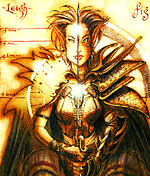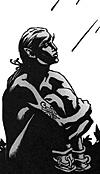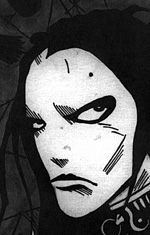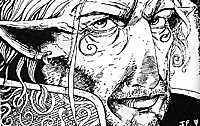 |
And pleasant is the faery land For those that in it dwell, By ay at end of seven years They pay a tithe to hell; I am sae fair and fu' o' flesh I'm fear'd twill be mysell. -Traditional, "Tam Lin" |
Changeling is a storytelling game about the Dreaming. It's about make-believe come to life, about imagination taking fruit. Changeling depicts the invisible world of fantasy that exists alongside our reality-a place of delight, mystery and enormous peril.
 The themes of this game are lost innocence and the cynicism of adulthood. When you play Changeling, you will come to understand that fairy tales aren't just for children (not that they ever were) and that they don't always have happy endings.
The themes of this game are lost innocence and the cynicism of adulthood. When you play Changeling, you will come to understand that fairy tales aren't just for children (not that they ever were) and that they don't always have happy endings.
You will discover what it is like to be exiled from your homeland, persecuted for your true nature and unable to express the sublime beauty welling forth from your soul. You will know what it is like to be alone in a crowd, to be aware of the power of dreams and to be able to tap the power of magic. And you will learn what it is like to be helpless in the arms of fate and unable to stop the crushing weight of Banality from robbing your memory of all you have discovered.
About This Book
Changeling is a game of make-believe, of pretend. But it is not a "game" in the normal sense of the word; Changeling is more about storytelling than it is about winning. If you've never played a storytelling game before, you may be confused by the whole premise of such games. Once you grasp the basic concepts, however, you'll find storytelling games aren't all that strange.
You and your friends are going to tell stories of wonder and delight. Tales of love and romance, tragedy and peril, lurking evil and heroic triumph. And at the heart of these stories are the lost fae.
These stories will capture your imagination far more readily than any play or movie. Likewise, they are of a darker tone than the children's fairy tales you might remember (although those, too, were rather grim in places). This is because you are inside the story, not just watching it. You are creating it as you go along, and the outcome is always uncertain.
What you need to do now is read this book, a little bit at a time, and enjoy it. You don't have to study it like a textbook or devour it like a newspaper. Just browse. Later on, when you're playing, you can consult and refer to whatever you need. You don't need to memorize anything -just have an idea of what your character can do and understand the world in which she adventures. Don't let anything in this book scare you out of having a good time--storytelling is, first and foremost, about fun.
Changeling Kind
 When we can't dream any longer, we die.
When we can't dream any longer, we die.
--Emma Goldman
You lead a double life, alternating between reality and fantasy. Caught in the middle ground between dream and wakefulness, you are neither wholly fae nor wholly mortal, but burdened with the cares of both. Finding a happy medium between the wild and insane world of the fae and the deadening, banal world of humanity is essential if you are to remain whole.
Such a synthesis is by no means easy. Mortal affairs seem so ephemeral and so trivial when you stand amid the ageless magnificence of the Seelie Court. When you don garments spun of pure moonlight and drink wine distilled from mountain mists, how can you go back to polyester and soda pop?
Alas, you have no choice. Although your faerie self is ageless and eternal, your mortal body and mind grow older and less resilient as you move through life. Sooner or later, nearly all Changelings succumb to one of two equally terrifying conditions: Banality, the loss of their faerie magic; or Bedlam, the loss of their mortal reason.
But is this fate inevitable ? Can you retain your childlike wonder while fighting against the frigid Banality that seeks to numb your mind and steal your past? Can you ride the currents of the Dreaming without being swept away in the maelstrom of Bedlam?
Tragically, you are alone in the mundane world. No mortal will ever understand the depth of your alienation, strangeness and uniqueness. Though you may try to communicate your condition through art (and many have I tried and failed), only those with faerie blood will see, understand and appreciate what you are.
An exile among exiles. Lost among the lost. A stranger in every crowd.
Hail, fellow traveler-welcome to the Dreaming.
Storytelling
Long ago, before movies, TV, radio and books, we told each other stories: stories of the hunt, legends of the gods and great heroes, bardic epics and tales of ravening monsters. We told these stories aloud, as part of an oral tradition of storytelling-a tradition that we have virtually lost.
Today we no longer tell stories-we listen to them. We wait to be picked up and carried to prepackaged worlds. We have become slaves to our TVs and VCRs, permitting an oligarchy of mythmakers to dictate the content of our imaginations.
It need not be this way. Storytelling on a personal level can be returned to our culture. This is essentially what Changeling is about: not stories told to us, but stories we tell others. Through the game and art of collaborative storytelling, we create new stories and claim the ancient myths and legends for our own.
Storytelling allows us to understand ourselves by giving us a medium to explain our triumphs and defeats. By looking at our culture, our family and ourselves in new contexts, we can understand things we never before realized. Storytelling is entertaining because it is so revealing, exhilarating because it is so true. Our fascination with stories has a purpose to it-of that there is no doubt.
Roleplaying
 Changeling is a storytelling game, but it is also a roleplaying game. As a Changeling player, you not only tell stories, but actually act through them by
assuming the roles of the central characters. It's a lot like theatre, but you make up the lines.
Changeling is a storytelling game, but it is also a roleplaying game. As a Changeling player, you not only tell stories, but actually act through them by
assuming the roles of the central characters. It's a lot like theatre, but you make up the lines.
To understand roleplaying, you need only think back to your childhood and those wonderful afternoons spent playing Cops 'n' Robbers, Cowboys and Indians, or DressUp. What you were doing was roleplaying, a sort of spontaneous and natural acting that completely occupied your imagination. This play-acting helped you learn about life and what it meant to be a grown-up. It was an essential part of childhood, but just because you have grown up doesn't mean you have to stop.
In Changeling, unlike pretend, there are a few rules to help you roleplay. They are used mainly to avoid arguments-"Bang! Bang! You're dead!" "No I'm not! "-and to add a deeper sense of realism to the story. Rules direct and guide the story's progress and help define the characters' capacities and weaknesses. The essential rules of Changeling are described in Chapter Four.
Changeling can be played with nearly any number of players, but roleplaying games in general work best with six or fewer players. Mystery and flavor are diminished when players must compete for attention.
The Storyteller
Changeling is structured a little differently from the games with which you might be familiar. In the first place, there is no board. Second, one player must assume the role of Storyteller-the person who creates and guides the stories.
Being the Storyteller is a bit like playing the Banker in Monopoly ™, but bears greater responsibilities and rewards than control over a handful of play money. The Storyteller describes what happens to the characters as a result of the players' words and actions. She decides if the characters succeed or fail, suffer or prosper, live or die. Storytelling is a very demanding task, but it is equally rewarding, for the Storyteller is a weaver of legends.
The Storyteller's primary duty is to make sure the other players have a good time. The way to do that is to tell a good tale. Unlike traditional storytellers, however, the Storyteller doesn't simply tell the story. Instead she creates the skeleton of a story and then lets the players flesh it out by assuming the roles of its leading characters.
Storytelling in Changeling is a careful balance between narration and adjudication, between story and game. Sometimes the Storyteller must set the scene or describe what occurs, but mostly she must decide how the environment responds to the characters. She must be as realistic, impartial and creative as possible.
As the Storyteller, you are in charge of interpreting and enforcing the rules, yet you are also an entertainer- you must struggle to balance your two roles. This book was written to help you do just that. It won't make being a Storyteller easy, because it never will be easy, but it will make you better at it.
The role of the Storyteller is explained in much more detail in Chapter Three.
The Players
Most Changeling players will not be Storytellers. They will instead assume the roles of the central characters in the story. Being a player does not require as much responsibility as being a Storyteller, but it does require just as much effort and concentration.
As a player in a Changeling chronicle, you assume the persona and role of a Changeling-a faerie being whom you invent and then roleplay over the course of one or several stories. The life of your character is in your hands, for you decide what the character says and does. You decide which risks to accept or decline. Everything you say and do when you play your character has an effect on the world.
You must also be an actor. You speak for your character and act out whatever you want your character to do or say. Whatever you say, your character says, unless you are specifically asking the Storyteller a question or are describing your actions.
As a player, you try to do things that allow your character to succeed and thus "win the game." This strategic element of the game is essential, for it is what so often creates the thrill and excitement of a dramatic moment.
Often, after describing the actions "you" want to take, you may have to make dice rolls to see if your character successfully accomplishes what you have illustrated with words. Your character's Traits-numbers quantifying her strengths and weaknesses-dictate how well your character can do certain things. Actions are basic elements of Changeling, for it is through actions that characters change the world and affect the course of the story.
Characters are central to a story, for they alter and direct the plot. Without characters you can't have a story. As the story flows, the characters, not the decisions of the Storyteller, direct and energize the progress of the plot.
To some extent, each player is an assistant Storyteller. Players should feel free to add ideas and elements to the story, although the Storyteller may accept or reject them as she sees fit. In the end, a good story is the most important goal. Players and Storytellers work together to make a story come to life.
 Characters
Characters
Many different elements compose what we think of as the "self": too many, in fact, to separate or identify. We really don't know who or what we are. It is from this essential diversity of self that our desire and ability to pretend to be someone else originate.
Characters are the literary versions of real people- they are not real, but they do capture some aspects of reality. Only when you enter the world of the story can your characters become complete. They are real only with you as the animating force-the soul, if you wish. Treat your characters as unique individuals, as works of art, or as fragile expressions of your poetic sensitivity. You must treasure the characters that you create.
Changeling characters are easy to create. It takes less than half an hour to choose all the Traits that describe your character. It takes more time and effort to turn this collection of numbers into a living, breathing character.
You must reach deep inside yourself to produce a complete character. The Frankenstein monster was easily assembled from available body parts; it was the breath of life that proved difficult.
Character creation is discussed in detail in Chapter Five.
Winners and Loser
There is no single "winner" of Changeling, for the object is not to defeat the other players. To "win" at all, players need to cooperate with each other. Because this is a storytelling game, there is no way for one person to claim victory. Moreover, the Changeling world is fraught with danger: monstrous chimera, implacable Dauntain, ever-encroaching Banality, and the machinations of the Unseelie Court. Players cannot afford to squabble with their brethren, for so doing leads to death-and the only I true measure of success in Changeling is survival.
If, however, a character has some overwhelming motivation (such as a need for vengeance), accomplishing this goal also becomes a measure of success. Stories and extended chronicles often come to conclusions that either benefit or harm the characters. If the players can turn stories to their characters' advantage, they have "won," at least for the moment. When a group of changelings manages to rescue a fellow changeling who has been captured by one of the Dauntain, those changelings can be considered to have "won" a temporary victory. If the Dauntain has powerful friends among the occult underground, however, attacking that individual may prove a dangerous exercise in the long run. A "victory" under these circumstances can become worse than defeat.
To achieve even partial victory, characters must usually become friends, or at least watch out for and have a modicum of trust in each other. The World of Darkness is a dangerous place, so trustworthy allies are essential. A divided group will not survive for long.
Playing Aids
Changeling was designed to be played around a table. Though the game does not require a board, a number of props require a table to use properly. Dice, pencils, paper and photocopies of the character sheet are the only other necessary items. The dice required are 10-sided; these you can purchase in any game store. The Storyteller may also want paper (to sketch out a setting, thus making it easier to describe to the players) and a few other props to show the players what the characters see (photographs, matches, scarves-anything to make the experience more vivid).
Live-Action
Live-Action roleplaying can be the most dynamic and fun part of playing Changeling. Live-Action roleplaying is similar to improvisational theatre: the actors (the players) act through the scenes created and introduced by the Storyteller. This creates a much more intense and immediate storytelling experience.
Players in a roleplaying game generally describe what their characters do and even say. During Live-Action roleplaying, however, players actually do what their characters do and say what their characters say (within limits).
They can stand up, walk around, hold up a letter, shake hands or rush to a window to see what is going on. Imagination is still important, and the Storyteller may still interrupt the action to describe objects and special situations.
No dice are used during Live-Action sessions; alternate rules, like those given in White Wolf's Mind's Eye Theatre line of Live-Action products, take the place of dice when needed. For the most part, everything is decided through acting. The Storyteller simply uses the characters' Traits to decide how well they manage to perform certain mechanical actions (such as picking a lock). The Story teller also decides how the other Storyteller-run characters react to the players' characters.
Rules
You must follow a few basic rules to ensure that Live Action roleplaying progresses smoothly and safely. These rules must be obeyed if you intend to run any Live-Action roleplaying at all. Safety is always a primary concern.
- Don't Touch: A player should never actually strike or grapple another member of the troupe. No sort of combat should ever be performed-that is one thing you should leave for the dice to decide. If players or Storyteller assistants get too rambunctious in their roles, the Story teller should call a time-out from the acting and remind everyone of the rules of play. Repeat offenders should be asked to leave, or the action should be returned to a table and conflicts resolved through dice rolls.
- No Weapons: No props can be used if they must touch another player to be effective. No real weapons of any sort can ever be handled at any time during Live Action roleplaying. Not even toy guns can be used. The "no touch" rules must always be in effect.
- Play Inside: Play inside your own home or in whatever private area the game normally takes place. Make sure that everyone else in the area understands what you are doing. Never perform Live-Action if passersby may be confused or frightened by the event. If you play outside, such as in the woods behind your house, make sure privacy is maintained.
- Know When to Stop: When the Storyteller calls for a time-out, all action must immediately stop. Even during Live-Action (especially during Live-Action), the Storyteller's word is final.
© Copyright 1996 by White Wolf
White Wolf, Vampire the Masquerade and Mage the Ascension are registered trademarks of White Wolf, Inc. All rights reserved. Vampire the Dark Ages, Werewolf the Apocalypse, Werewolf the Wild West, Wraith the Oblivion, The Risen, and Changeling The Dreaming are trademarks of White Wolf, Inc. All rights reserved. All characters, names, places and text herein are copyrighted by White Wolf, Inc. Reproduction without the written permission of the publisher is expressly forbidden, except for the purposes of reviews. The mention of or reference to any company or product in these pages is not a challenge to the trademark or copyright concerned. Because of the mature themes involved, reader discretion is advised. Check out White Wolf on the World Wide Web at http://www.white-wolf.com
Magazine articles and contents are copyrighted property of the respective publication. All copyrights, trademarks, and other rights are held by the respective magazines, companies, and/or licensors, with all rights reserved. MagWeb, its contents, and HTML coding are © Copyright 1996 by Coalition Web, Inc. This article appears in MagWeb (Magazine Web) on the Internet World Wide Web.
Other military history articles and gaming articles are available at http://www.magweb.com